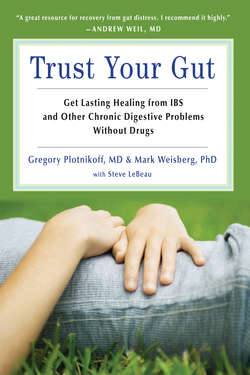Читать книгу Trust Your Gut - Gregory Plotnikoff - Страница 36
На сайте Литреса книга снята с продажи.
Bill Learns to Listen
ОглавлениеBill was a manufacturer's rep in his twenties who suffered from abdominal cramping, bloating, pain, and constipation for at least eight years. His symptoms made his work very difficult because he was on the road several days a week traveling over a five-state area. The long hours in his car, the quick stops for fast food, and the uncomfortable motel beds all made his intestinal discomfort worse.
Like many gut sufferers, Bill had run the gamut of doctors and clinics trying to find answers and relief for his distress. After taking all the tests and seeing all the specialists, Bill was told that he had IBS. The physicians tried to help, but ultimately they encouraged him to learn to live with it.
This advice backfired. Bill's frustration only made his symptoms worse. He'd cancel sales calls and break dates with his girlfriend. He just felt too lousy. Bill was at the end of his rope. Finally he went to Dr. Weisberg, who asked him, “How often do you actually observe your gut distress?”
Bill said, “Are you kidding me? I observe this distress 24/7! It's always with me, never leaves me alone!”
“Yes,” Dr. Weisberg responded, “but how much of that time do you actually just sit and notice the sensations? If you're like most of our patients, when you feel a spike of pain, bloating, or pressure, you probably notice the feeling of it for about five seconds. This annoys you and makes you anxious, and then you probably start thinking things like, Oh no, not this again. How long is it going to last this time? What happens if the pain and bloating interfere with my sleep tonight?
Bill thought about it for a minute, smiled slightly, and said, “Now that you mention it, I think you're right! How did you know?”
“These are very natural responses. I see this all the time.”
Dr. Weisberg told Bill to point to where he felt the pain and bloating. Bill pointed to an area about six inches long in the center of his lower abdomen. He rated the intensity of the discomfort at five out of ten.
“Good,” said Dr. Weisberg. “Now focus on the sensations in that area you just showed me. Imagine you're just going to pull up a chair and sit right next to those sensations exactly the way they are, without changing them or trying to make them relax in any way.”
Bill looked puzzled. “But I do want to change them—I want those bad feelings to go away as quickly as possible.”
“Of course you do, but the way that you've been trying to make them go away hasn't been working very well, has it? So let's experiment on a new way of working with all of this, okay?”
Bill nodded and settled more fully into the chair. As he sat with the sensations and focused on them, he looked puzzled, almost surprised, as if he had never really paid such close attention to his sensations before. “It's interesting,” he said. “There's actually a lot of movement going on there. The left side of it feels now like a slight throbbing sensation, and the right side feels kind of dull.”
“Very good,” Dr. Weisberg replied. “Just make room for the left side of it to throb and the right side to feel the way it does. All you have to do is keep observing it and make room for it to do whatever it's doing.”
Bill watched his intestinal show unfold for six or seven minutes and then looked up with a pleasant, yet surprised, expression. “It's really something!” he exclaimed. “The left side throbbed more, and then the throbbing moved over to the other side. The area of bloating seemed to get bigger, and then smaller. I was really amazed to see how much everything was moving and changing. That fact was comforting to me because it meant my gut wasn't stuck and could actually change. It seemed like the more I made room for all those different sensations to be there, the less noticeable they became.”
Plus the pain decreased. “It was at a five, but I can barely notice it now—I'd say it's a one out of ten. I didn't think it was possible.”
Bill learned to observe his gut on his own, and when he returned for the second appointment ten days later, he was very pleased to report that the frequency and intensity of the pain in his gut was noticeably reduced. His third appointment became his last, because the symptoms hardly bothered him at all anymore.
